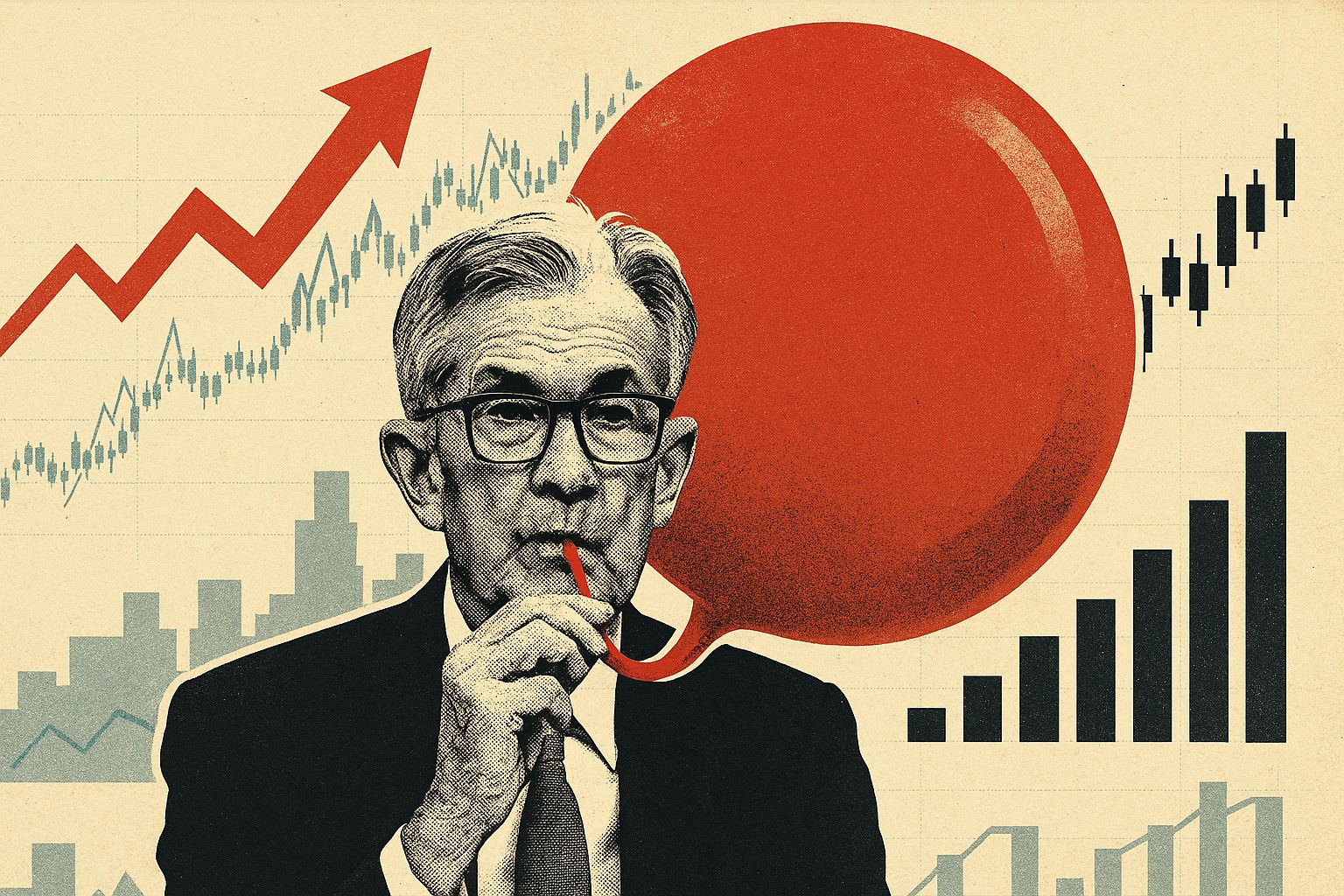Good morning, investors. Wednesdays do not get much busier than the one we just saw — a Fed decision, a major trade deal, and earnings from some of the biggest companies in the world.
But one comment in particular stuck out for bubble-watchers.
Not like the 90s
Jerome Powell doesn’t see an AI bubble.
That seems like the bigger takeaway versus the fact the Federal Reserve did what everyone expected by cutting interest rates by 25 basis points.
And while stocks dipped after Powell said another move lower in December wasn’t a sure thing, even that felt negligible in comparison.
One reporter asked the Fed chairman to share his thoughts on the huge amounts of spending tied to artificial intelligence, and whether he saw similarities between the AI boom and the dot-com bubble.
Sharing the view of Opening Bell Daily, Powell doesn’t believe the comparison holds weight.
“This is different in the sense that these companies [today] that are so highly valued actually have earnings and stuff like that,” he said.
“If you go back to the nineties and the dot-com, these were ideas rather than companies. So there was a clear bubble there.”
To his point, valuations for leading technology names in 2000 far outpaced those of today.
Even Nvidia, which just surpassed a $5 trillion market cap, hovers just below a forward price-to-earnings ratio of 33 — a fraction of what Oracle and Cisco saw just before the dot-com crash.
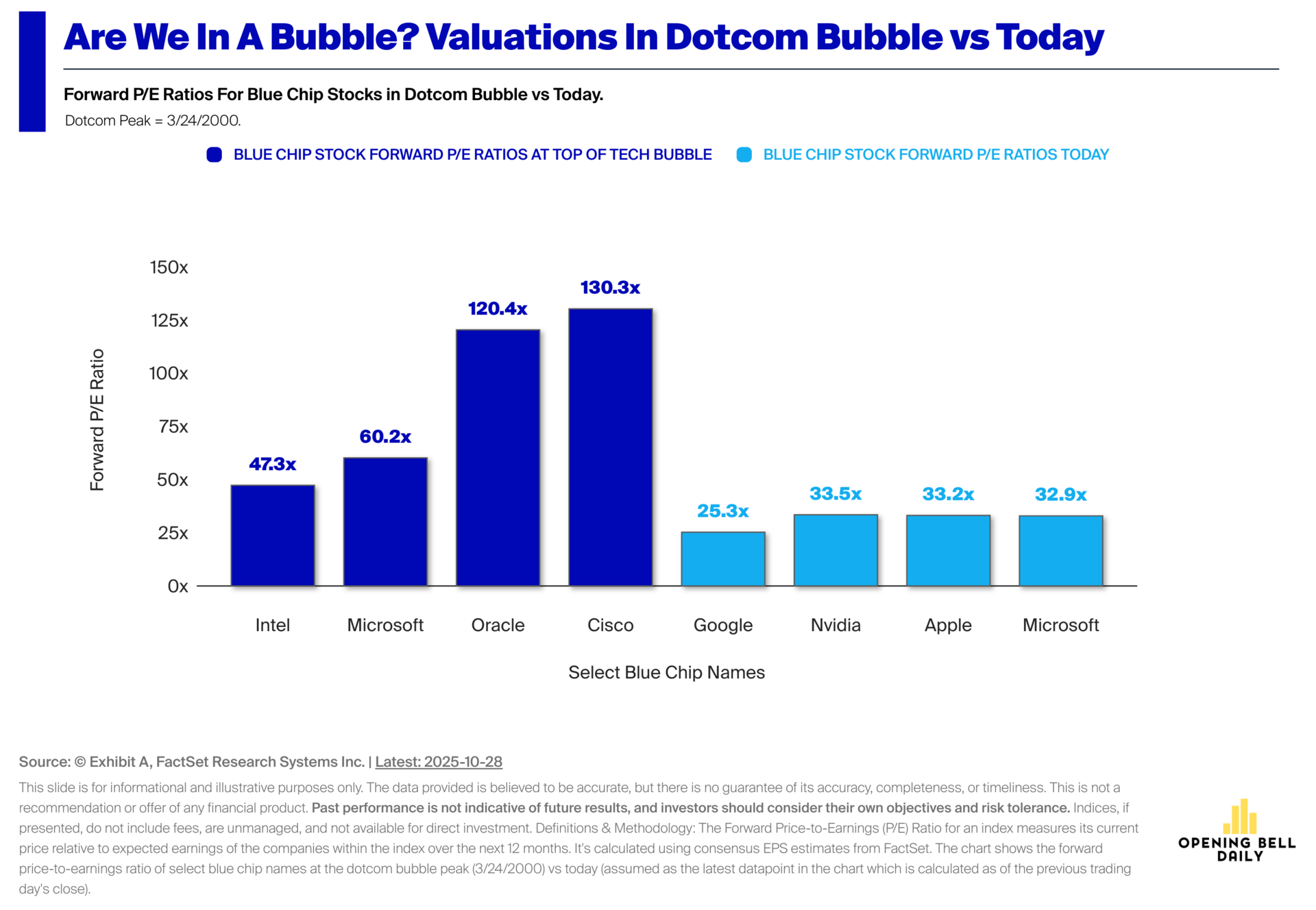
Valuations today are far lower than the dot-com era (Chart courtesy of Exhibit A)
Without naming individual stocks, Powell added that the Big Tech sector in 2025 is reporting real earnings and profits on the back of actual business models, which wasn’t the case more than two decades ago.
The central banker was also unconcerned about how much AI spending was contributing to economic growth.
Indeed, Meta, Microsoft, Google, Amazon and Oracle, for instance, will spend nearly $400 billion combined for the fiscal year 2025 — roughly triple what the group spent before ChatGPT launched in 2022.
“[AI] is clearly one of the big sources of growth in the economy,” Powell said.
“Consumer spending also though is much bigger than that and has been growing, and has defied a lot of the negative forecasts.”
In any case, the Fed voted to lower its benchmark borrowing rate into the range of 3.75% to 4% in a 10-2 vote on account of moderating inflation and a weakening labor market.
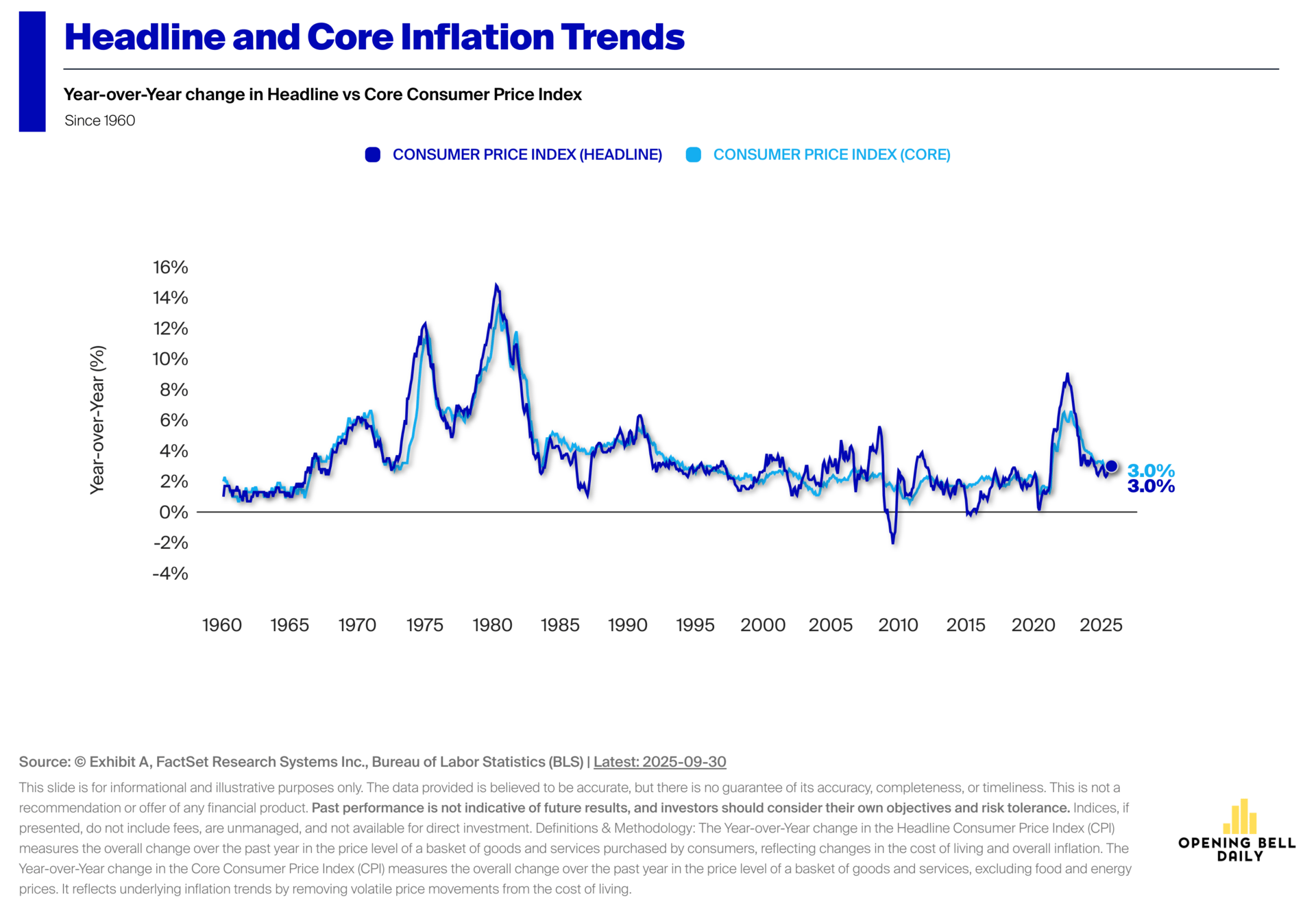
Inflation still hovers at 3% (Chart courtesy of Exhibit A)
Governor Stephen Miran dissented in favor of cutting 50 basis points, while Kansas City Fed President Jeffrey Schmid dissented in favor of making no move.
US stocks gave up their gains from earlier in the day, with the Dow closing negative and the S&P 500 flat.
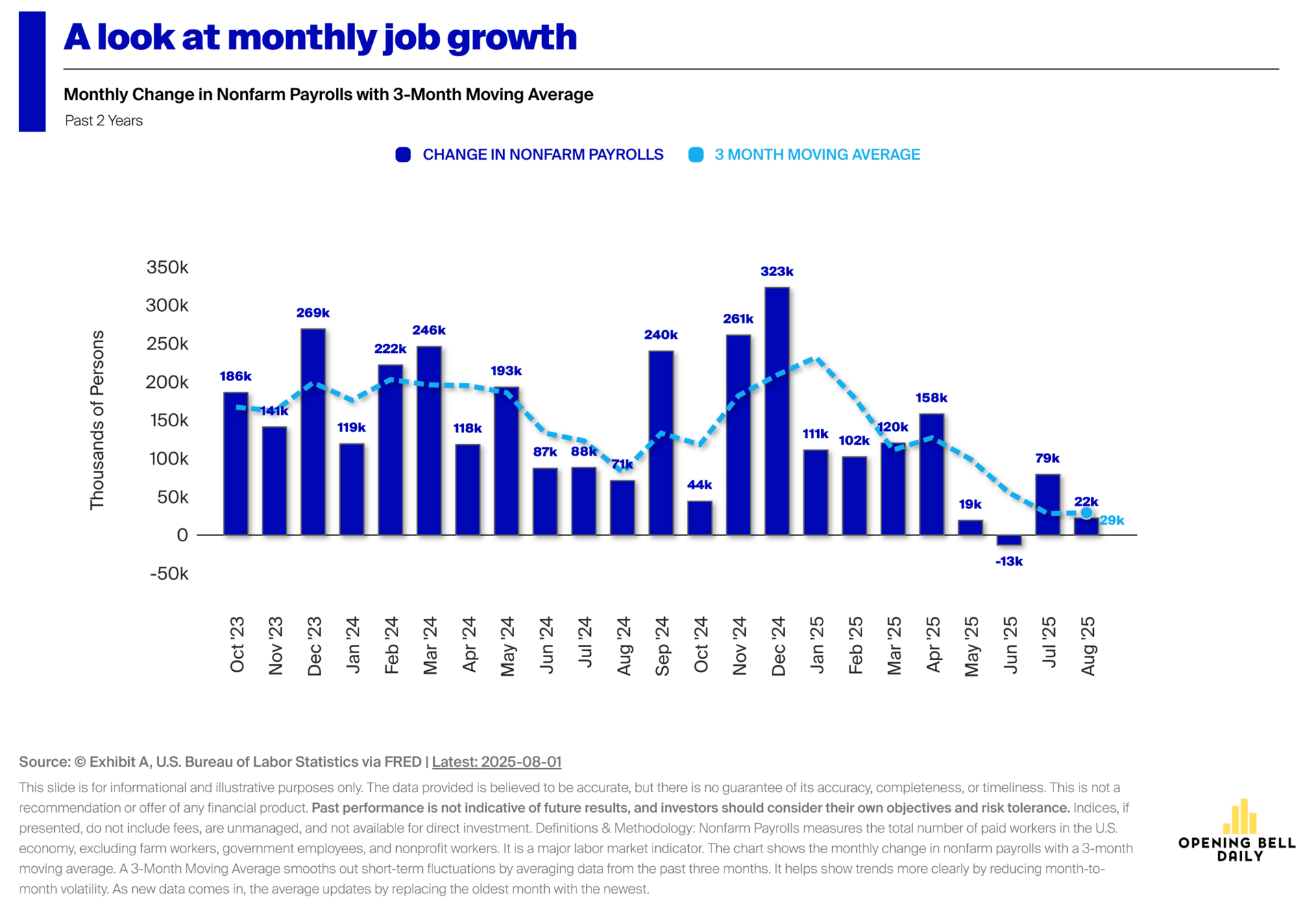
Job growth has softened all year (Chart courtesy of Exhibit A)
“We think this will prove to be a buying opportunity because the Fed is likely to continue to support both stock and bond markets by cutting interest rates significantly over the next 12 months,” said Chris Zaccarelli, chief investment officer for Northlight Asset Management, “even if they do keep rates unchanged in December.”
Today’s letter is brought to you by reAlpha!
What if buying a home felt as seamless as buying a car? With reAlpha, it can.
Think of it as an AI-powered homebuying platform in your pocket, with licensed experts guiding you at every step.
Realty, mortgage and title — all in one place, powered by the latest technology.
And when you close with reAlpha, you may qualify for a buyer’s agent commission rebate.
Homebuying is complex. reAlpha helps smooth the journey.
Market snapshot
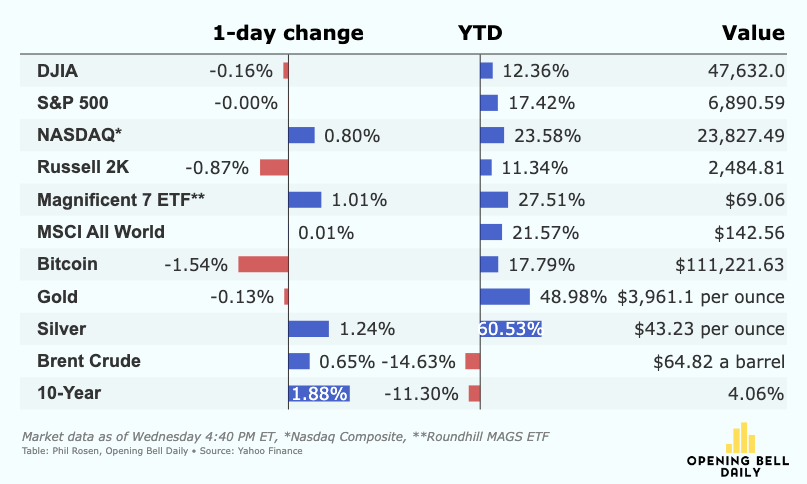
Elsewhere
🤖 Meta missed earnings estimates. The stock fell more than 9% after the company reported revenue of $51.24 billion in the quarter as it aims to spend continue spending heavily in AI to power its ad business and user growth. (Yahoo Finance)
🔍 Alphabet stock soared after hours. The Google parent topped $100 billion quarterly revenue for the first time ever, beating estimates across the board in YouTube, Cloud, and traffic acquisition costs. (CNBC)
📊 Microsoft stock fell despite beating earnings forecasts. It beat on top and bottom lines, with its cloud business continuing to outperform, yet the stock slipped. The company saw revenue of $77.7 billion in the quarter. (Yahoo Finance)
Rapid-fire
Chipotle stock fell after cutting its full-year sales outlook for the third quarter in a row (Yahoo Finance)
Starbucks reported same-store sales growth for the first time in 2 years (CNBC)
Treasuries sold off across the board after the Fed’s rate cut (Barron’s)
Microsoft saw an Azure and 365 outage hours before its earnings report (CNBC)
Eli Lilly and Walmart have teamed up to offer the first retail pickup option for the discounted weight-loss drug Zepbound (CNBC)
Fiserv stock tumbled 43% after the fintech name slashed its guidance for the year (CNBC)
ServiceNow shares fell 2.8% after raising its revenue forecast (Reuters)
On this day
🗓October 30, 1929: The Dow staged an unexpected 12.3% rebound after the historic sell-off that many consider the start of the Great Depression. Few investors were ready at the time for the momentary surge after Black Monday and Black Tuesday.
Last thing
About me
📰 I’m Phil Rosen, co-founder of Opening Bell Daily. I’ve published books, lived on three continents, and won awards for my journalism, which has appeared in Business Insider, Fortune, Yahoo Finance, Bloomberg and Inc. Magazine.
I write our flagship newsletter to prepare you for each trading day — unpacking markets, economic data and Wall Street with analysis you won’t find anywhere else.
Feedback? Reply to this email, ping me on X @philrosenn, or write me directly at [email protected].
*reAlpha Disclaimers: Actual savings vary and are not guaranteed. Not available in all states. Terms apply. reAlpha Realty, LLC | reAlpha Mortgage | NMLS #1743790 | Equal Housing Opportunity

